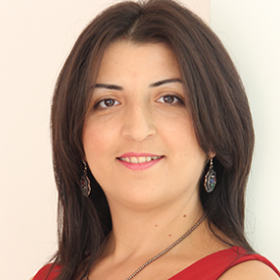
EWI Webinar on International Organizations and Conflict Resolution in the Time of COVID-19
On December 7, the EastWest Institute (EWI) conducted a webinar on "International Organizations and Conflict Resolution in the Time of COVID-19." The webinar featured distinguished speakers Hon. Izumi Nakamitsu, under-secretary-general and high representative for Disarmament Affairs at the United Nations, and Ambassador Tuula Yrjölä, officer-in-charge/deputy head of the Secretariat and director of the Conflict Prevention Centre.
The webinar was moderated by Bruce McConnell, EWI president and CEO Discussants included Dr. Mark Meirowitz, professor of humanities at SUNY Maritime College in New York and EWI senior fellow, and Nvard Chalikyan, consultant for EWI’s Russia and the United States program.
The panelists discussed how COVID-19 impacts the operations of conflict resolution organizations, particularly in their ability to execute their missions within the constraints of a digital work environment.
Hon. Izumi Nakamitsu said that COVID-19 is having a devastating effect on all aspects of the UN Sustainable Development Goals, especially on security and development, as it has accelerated many existing security threats. As states have increased their military spending, with emerging weapon technologies coming into play, this has added to the intensity of armed conflicts. Pandemic-related processes have also exacerbated the existing strain on the global disarmament and arms control regime. All these are challenges that the UN and other international organizations are struggling to deal with.
Looking ahead, Nakamitsu said that the coming decade will be crucial to the international community, noting that to achieve better outcomes, there must be renewed ambition, leadership and collective efforts that people at the centre of global responses. "Such times of pressing emergency and widespread turmoil represent a crucial opportunity to propose bolder approaches to conflict prevention," she noted.
Nakamitsu also stressed the importance of concerted multilateral efforts in mobilizing government and private sector actors around development and implementation of norms of behavior, citing the example of EWI’s Global Cooperation in Cyberspace program.
Ambassador Tuula Yrjölä said that COVID-19 has had an unprecedented effect on multilateralism and conflict resolution efforts in general, and in particular, on the security operations of the OSCE in the regions they cover—Ukraine, Transnistria, Georgia and Nagorno-Karabakh.
While the OSCE has adapted its work to the current circumstances by moving its main activities online, many functions of the organization have been hampered. At the same time, the pandemic has accelerated the need to find technological tools to support conflict resolution mechanisms. Despite the UN call for a global ceasefire, the pandemic has given rise to political and military threat perceptions in the OSCE and to the revival of frozen conflicts, exemplified in the recent war in Nagorno-Karabakh.
"The impact [of the pandemic] could exacerbate further by an economic crisis that can affect all states in the region as well as globally," concluded Yrjölä, stressing the need for more resources to be allocated to conflict resolution organizations.
Discussant Nvard Chalikyan presented recent research by the EastWest Institute on the impact COVID-19 has had on global security and the work of Track 2 organizations. The pandemic has resulted in the emergence of new conflicts and the resergence of old security threats, including a rise in terrorism and radicalization, escalation of the nuclear arms race, the proliferation of weapons of mass destruction and a lack of implementation of arms control regimes, among others. This has generated a greater need for the work of international organizations involved in Track 2 conflict resolution. "Speaking in economic terms, the demand for conflict resolution is higher than the supply, so we need to think of ways to increase the supply," she noted.
Chalikyan also reflected on the case of the recent war in Nagorno-Karabakh—when Azerbaijan, supported by Turkey, seized a majority of the unrecognized Nagorno-Karabakh Republic by force, breaching international law. Despite well-documented attacks on the civilian population and the use of prohibited weapons, there was no interference by the international community. The case raises questions about the capacity of international conflict resolution organizations to prevent or stop wars, especially during a pandemic.
Dr. Mark Meirowitz spoke about the lessons learned from the pandemic. He noted that the world is in conflict because of the competition between the great powers, which continue to play a crucial role in various conflicts without interference or accountability from multilateral organizations, such as the UN.
He also raised whether after the pandemic, the world of international relations will go back to “business as usual” or will be obliged to come up with new processes. "Maybe the UN system is not amenable to the world as we see it today; maybe there needs to be a reset of the UN and how it functions," he noted.
Meirowitz believes that the Biden administration will be helpful in overcoming the crisis of multilateralism, as it will be less critical of the UN and international organizations. While during the pandemic the states have been looking inward, he thinks the world will be needing more multilateral engagement and Track 2 activities.
During the Q&A session, several webinar participants asked why the COVID-19 pandemic has had a more dividing effect, rather than bringing the international community together. Other participants posed the question as to whether Track 2 diplomacy would ever be conducted as it was before the COVID pandemic.
Commenting on this, Ambassador Yrjölä said that it is largely up to the participating states to recognize the value of multilateralism and get out of this crisis. She also thinks that international organizations working on conflict resolution will most likely have more blended work formats going forward. Nakamitsu said that the pandemic has exacerbated these problems and challenges, and it has created a greater need for the revival of multilateralism.
Click here to watch the full webinar on YouTube.

